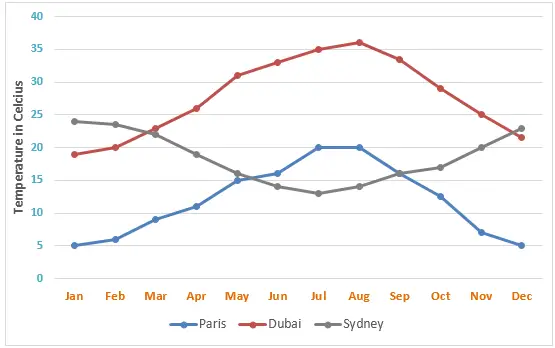You should spend about 20 minutes on this task.
The line graph below shows the average monthly temperatures in three major cities.
Summarize the information by selecting and reporting the main features, and make comparisons where relevant.
You should write at least 150 words.

Sample Answer 1
The line graph displays the changes in temperature in three cities (Paris, Dubai and Sydney) at different months of the year. Temperature is measured in Celsius degrees.
Overall, the weather pattern in Sydney is quite the opposite of Dubai and Paris. Furthermore, Paris is the coldest city among the three.
To begin with, the temperature in Paris never goes above 20 degrees. In contrast, Dubai seldom sees its temperature below this level, except for January (19 degrees C). However, despite the striking differences, the temperatures in Paris and Dubai still have some similarities, as they rise continually from the beginning of the year to a peak in August. The highest temperature in Paris and Dubai are 20 and 36 degrees, respectively. Afterwards, both cities became colder, and the temperature fell steadily. As can be seen, the differences in temperature between August and December in both Paris and Dubai are the same, 15 degrees Celsius.
Regarding Sydney, it witnessed 24-degree temperatures in January. From there, the temperature drops continuously before reaching the lowest point of 14 degrees in July. The five remaining months see the temperature increase dramatically, to reach 23 degrees by the end of the year.
Sample Answer 2
The average monthly temperature of three cities – Paris, Dubai and Sydney, is given in the bar graph, and the data compares how the temperature in these cities changes throughout the year. The temperature is measured in Celsius. Overall, Dubai and Paris have comparatively warmer conditions between April and August, while an opposite trend is witnessed in Sydney, where the first two and last two months of the year have a higher temperatures.
As the illustration suggests, the temperature in Sydney is roughly 25-degree centigrade in January, which is the warmest month of the year there. At that time, the temperature in Dubai is just below 20 degrees, which is this city’s coldest month. At 5 degrees centigrade, Paris at that time behold the coldest month of the year.
The temperature in Sydney remains above 20-degree till mid-March, then it keeps falling till July when it has nearly 13 centigrade temperatures, the coolest. The temperature there steadily increases throughout the year before reaching 23-degree in December. Conversely, Paris’s temperature remains below 20 degrees throughout the year except in July and August. Paris seems like the coldest city among the three. Finally, the temperature in Dubai reaches as high as 36-degree centigrade in August, and this city has a warmer condition from April to October.
